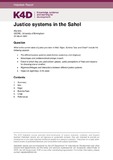| dc.contributor.author | Idris, Iffat | |
| dc.coverage.spatial | Mali | en |
| dc.coverage.spatial | Burkina Faso | en |
| dc.coverage.spatial | Niger | en |
| dc.coverage.spatial | Chad | en |
| dc.date.accessioned | 2020-04-24T08:16:21Z | |
| dc.date.available | 2020-04-24T08:16:21Z | |
| dc.date.issued | 2020-03-30 | |
| dc.identifier.citation | Idris, I. (2020). Justice systems in the Sahel. K4D Helpdesk Report 765. Brighton, UK: Institute of Development Studies. | en |
| dc.identifier.uri | https://opendocs.ids.ac.uk/opendocs/handle/20.500.12413/15247 | |
| dc.description.abstract | This review looks at justice provision in four countries in the Sahel: Mali, Niger, Burkina Faso and Chad. All feature formal (state) justice systems alongside customary/religious justice, with the latter typically being seen by citizens as more accessible, cheaper and less corrupt. State justice systems in all the countries face similar challenges: corruption, resource and capacity constraints, and political interference. However, there are also significant issues with customary justice mechanisms, notably exclusion (or limited participation) of women and other marginalised groups. This review is based largely on grey literature, in particular studies by think tanks and international development partners. While substantial information was found about both the formal justice system and customary justice provision in Mali, far less was found about these in the other countries, with hardly any on justice provision in Chad. This review highlights considerable gaps in the evidence base and the need for more research on the challenges facing formal justice systems in the four countries; the prevalence and precise nature of customary justice mechanisms; and public perceptions of both, including reasons for favouring one or the other. Information on Chad and Burkina Faso is especially limited. A more accurate and detailed understanding of justice provision would help identify approaches to strengthen justice provision, based on a pragmatic assessment of areas and scope for improvement. Clearly, given the constraints facing formal justice systems, there is a role for customary justice mechanisms, but safeguards are needed to ensure protection of human rights for all. | en |
| dc.language.iso | en | en |
| dc.publisher | IDS | en |
| dc.relation.ispartofseries | K4D Helpdesk Report;765 | |
| dc.rights.uri | https://www.nationalarchives.gov.uk/doc/open-government-licence/version/3/ | en |
| dc.subject | Governance | en |
| dc.subject | Rights | en |
| dc.subject | Security and Conflict | en |
| dc.title | Justice Systems in the Sahel | en |
| dc.type | Helpdesk | en |
| dc.rights.holder | © DFID - Crown copyright 2020 | en |
| dcterms.dateAccepted | 2020-03-30 | |
| rioxxterms.funder | Department for International Development, UK Government | en |
| rioxxterms.identifier.project | K4D | en |
| rioxxterms.version | VoR | en |
| rioxxterms.funder.project | 238a9fa4-fe4a-4380-996b-995f33607ba0 | en |

